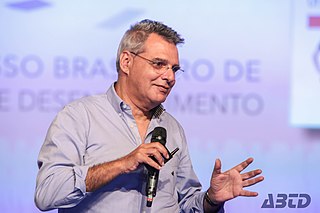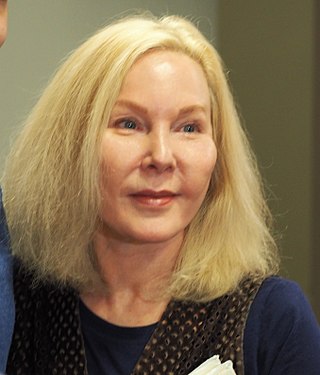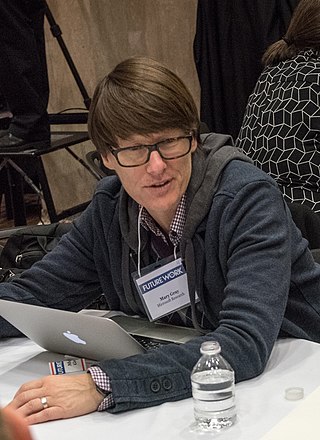
The Santa Clara Valley is a geologic trough in Northern California that extends 90 miles (140 km) south–southeast from San Francisco to Hollister. The longitudinal valley is bordered on the west by the Santa Cruz Mountains and on the east by the Diablo Range; the two coastal ranges meet south of Hollister. The San Francisco Bay borders the valley to the north, and fills much of the northern third of the valley. The valley floor is an alluvial plain that formed in the graben between the San Andreas Fault to the west and the Hayward and Calaveras faults to the east. Within the valley and surrounding the bay on three sides are the urban communities of San Mateo County, Santa Clara County, and Alameda County, while the narrow southern reaches of the valley extend into rural San Benito County to Hollister. In practical terms, the central portion of the Santa Clara Valley is often considered by itself, contained entirely within Santa Clara County.

William Drayton is an American social entrepreneur. Drayton was named by U.S. News & World Report as one of America's 25 Best Leaders in 2005. He is responsible for the rise of the phrase "social entrepreneur", a concept first found in print in 1972.

The Orange Line is a Bay Area Rapid Transit (BART) line in the San Francisco Bay Area that runs between Berryessa/North San José station and Richmond station. It has 21 stations in San Jose, Milpitas, Fremont, Union City, Hayward, San Leandro, Oakland, Berkeley, El Cerrito, and Richmond. It is the only one of the five primary BART services that does not run through the Transbay Tube to San Francisco; however, it shares tracks with the four other primary services in the East Bay.

Gilberto Dimenstein was a Brazilian journalist. He was the publisher of Catraca Livre, appointed by Financial Times as one of the most inspiring applications of digital technology for social good. He also kept a column at CBN radio.
José Antonio "Tony" Burciaga was an American Chicano artist, poet, and writer who explored issues of Chicano identity and American society.

Garance Franke-Ruta was most recently the executive editor of GEN by Medium. She has worked as Washington editor of Yahoo News and editor in chief of Yahoo Politics, Voices columnist and politics editor of The Atlantic Online, national web politics editor for the Washington Post, senior editor at the American Prospect and senior writer at the Washington City Paper, D.C.'s alternative weekly newspaper. Her work has also appeared in Medium magazine, New York, TheWall Street Journal, The Atlantic, The New Republic, Slate, Salon, The Washington Monthly, Legal Affairs, Utne Reader and National Journal. After first attending Hunter College, she transferred to Harvard University, where she graduated magna cum laude in 1997.
New America Media (NAM) was a multimedia ethnic news agency and a coalition of ethnic media. Founded in 1996 by the nonprofit Pacific News Service, NAM was headquartered in San Francisco, with offices in Los Angeles, New York and Washington, D.C.

Katherine "Kate" J. Boo is an American investigative journalist who has documented the lives of people in poverty. She has received the MacArthur Fellowship (2002), the National Book Award for Nonfiction (2012), and her work earned the 2000 Pulitzer Prize for Public Service for The Washington Post. She has been a staff writer for The New Yorker magazine since 2003. Her book Behind the Beautiful Forevers: Life, Death and Hope in a Mumbai Undercity won nonfiction prizes from PEN, the Los Angeles Times Book Awards, the New York Public Library, and the American Academy of Arts and Letters, in addition to the National Book Award for Nonfiction.
Ellen M. Barry is an American attorney and public interest lawyer who focuses on prisoners' rights. She was a 1998 MacArthur Fellow.

Ai-jen Poo is an American labor activist. She is the president of the National Domestic Workers Alliance. She is also the director of Caring Across Generations, a national coalition of 200 advocacy organizations working to transform the long-term care system in the US, with a focus on the needs of aging Americans, people with disabilities, and their caregivers.

Aram Byer James is a former Santa Clara County, CA Assistant Public Defender, police watchdog, social activist, and civil rights attorney. As an expert on the defense of necessity, he headed the team of attorneys defending Stanford University students and professors arrested in anti-apartheid protests in 1980’s. He is an advocate of jury nullification, educator in the use of the Marsden Motion to fire ineffective public defenders, a critic of the prison industrial complex, and critic of police use of tasers and racial profiling.
Terry Acebo Davis is a Filipino American artist and nurse based in the San Francisco Bay Area. Her art is thematically linked to her family and her origins as a Filipino American.
Nina Simon is an American exhibition curator, writer, educator, and museum director. She is the founder of the non-profit organization OF/BY/FOR ALL. Simon previously was the executive director of the Santa Cruz Museum of Art & History, from 2012 until June 2019. She is the author of three books: The Participatory Museum, The Art of Relevance, and, in 2023, her first novel, Mother-Daughter Murder Night, which was a New York Times bestseller and Reese Witherspoon Book Club pick.
Paul Duan is a French social entrepreneur, founder of the NGO Bayes Impact.

Mary L. Gray is an American anthropologist and author. She is a Fellow at Harvard University's Berkman Klein Center for Internet and Society, as well as a Senior Principal Researcher at Microsoft Research. Along with her research, Gray teaches at Indiana University, maintaining an appointment as an Associate Professor of the Media School, with affiliations in American Studies, Anthropology, and Gender Studies. In 2020, she was awarded a MacArthur Genius Grant in recognition of her work "investigating the ways in which labor, identity, and human rights are transformed by the digital economy."

Jason De León is an anthropologist, a National Geographic Emerging Explorer (2013), and a MacArthur Foundation 2017 Fellow. He studies the migration from Latin America to the United States of clandestine migrants crossing the U.S.–Mexico border. De León is Professor of Anthropology and Chicana, Chicano, and Central American Studies at the University of California, Los Angeles and Director of the Undocumented Migration Project t, a non-profit research/arts/education collective aimed at documenting and raising awareness about migration issues while also assisting families of missing migrants search for their loved ones.

Ruth Tunstall Grant (1945–2017) was an African American artist, educator and activist in the San Francisco Bay Area known for her paintings, community activism, and arts advocacy. Her work has been featured in many invitational group exhibitions as well as solo shows at national and international venues such as Dallas Museum of Fine Art, Dallas, Texas; Rath Museum, Geneva, Switzerland; Triton Museum of Art, Santa Clara, California; San Jose Museum of Art, San Jose, California; and Los Gatos Museum of Art, Los Gatos, California. She had a strong focus on community service and advocacy of children’s rights and social justice in and beyond Santa Clara County. She established many innovative, ongoing arts programs and inspired creative activists, such as Marita Dingus.
Jan Rindfleisch is an American artist, educator, author, curator, and community builder. Rindfleisch is known for the programming she initiated and oversaw at the Euphrat Museum of Art; for her book on the history of art communities in the South Bay Area, Roots and Offshoots: Silicon Valley's Art Community, and for her role in documenting the careers and legacies of Agnes Pelton and Ruth Tunstall Grant.
WORKS/San José is a nonprofit, member-run art space, located in the SoFA district of San Jose, California. It was founded in 1977 by community members.
Participatory defense is a community organizing model that empowers individuals and communities to actively participate in the defense of their loved ones facing criminal charges. Developed in 2009 in the United States, this model seeks to transform the criminal justice system. Participatory defense enhances the influence of essential stakeholders—individuals accused of crimes, their relatives, and their communities—in efforts to reform the system. It enables these stakeholders to evolve from being mere recipients of services from attorneys and other experts to becoming proactive contributors who demand increased transparency, accountability, and equity from criminal justice systems.











